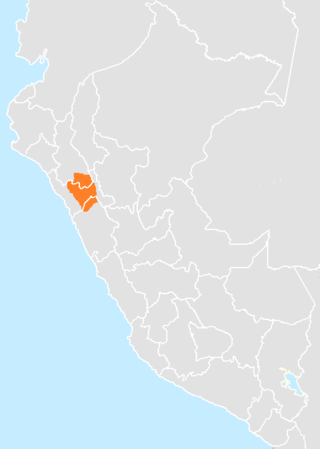Culle language
| Culle | |
|---|---|
| Culli, Kulyi | |
| Native to | Peru |
| Region | La Libertad, Cajamarca (Cajabamba), Ancash (Pallasca) |
| Extinct | mid-20th century? |
unclassified (Hibito–Cholon?) | |
| Language codes | |
| ISO 639-3 | None (mis) |
| Glottolog | cull1235 |
 | |
Culle, also spelled Culli, Cullí, or Kulyi, is a poorly attested extinct language of the Andean highlands of northern Peru. It is the original language of the highlands of La Libertad Region, the south of the Cajamarca Region (Cajabamba), and the north of the Ancash region (Pallasca). It is known through various word lists collected while the language was still spoken and through vocabulary loaned into the Spanish spoken in the region.[1]
Flores Reyna (1996) reports that Culli was spoken by at least one family in the town of Tauca, Pallasca Province, Ancash region, until the middle of the 20th century. While it appears that Culli has been displaced in its whole range by Spanish, the possibility of speakers remaining in some remote village cannot be ruled out altogether.[2]
Vocabulary
What little is known of the Culle language consists mostly of vocabulary. A sample list of words is given by Loutkotka; some of these are presented here:[3]
- ahhi – woman
- čallua – fish
- ču – head
- čukuáll – heart
- koñ, goñ – water
- kumú – drink
- mú – fire
- múñ – moon
- urú – tree
- usú – man
Classification
Because it is poorly attested, it has not been possible to definitively classify Culle.
References
- ^ Adelaar, William F.H.; Pieter C. Muysken (2004). The Languages of the Andes. Cambridge: Cambridge University Press. pp. 401–405. ISBN 0-521-36275-X.
- ^ Adelaar, 1988
- ^ Loukotka, Čestmír (1968). Classification of South American Indian Languages. Los Angeles: UCLA Latin American Center. pp. 63–65.
